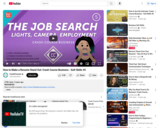
This video covers some tips and tricks to making your resume stand out.
- Subject:
- Business and Communication
- Material Type:
- Lecture
- Provider:
- Complexly
- Provider Set:
- Crash Course Business Soft Skills
- Date Added:
- 04/10/2019

This video covers some tips and tricks to making your resume stand out.
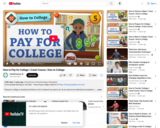
Paying for college is stressful and there's a lot of research we need to do. So we want to be methodical and patient, and make sure we know what all of our options are. So, in this episode, Erica walks us through how to know our options, what steps to take to get the funding you need to be successful in college.
Chapters:
- Introduction
- Understanding costs
- Finding financial aid
- Different types of schools
Review
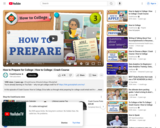
In this episode of Crash Course: How to College, Erica talks us through what preparing for college could entail and how we can be active in that preparation. Applying to college is exciting and stressful and lots of other things that cause a whole lot of emotions. But you can take steps now that will make the college admissions process a lot easier once you get to that point.
Chapters:
- Introduction
- Getting organized
- Goals
- Courses
- Standardized tests
- Figuring out your interests
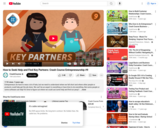
Entrepreneurs do have to wear a lot of hats, but we need to understand where we fall short and where other people or products could help get the job done. We can’t be an expert in everything or have time to do everything. But some people or some software can help! It’s time to figure out where we could use some help and find our people.
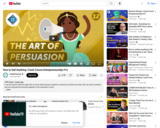
It can be hard to strike the right tone or know what’s going to appeal to someone, but there are tricks. We can craft a narrative and use well-placed emotional appeals to tell customers a story.
Even if you don’t consider yourself a persuasive person, you don’t need a +5 charisma modifier to succeed at this crucial stage of entrepreneurship.
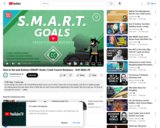
I know things can seem a bit overwhelming when you’re out of school, there are no more grades, and all of a sudden people are talking about five-year plans when it feels like you don’t know what’s happening in five weeks. But we’ve got you. It's time to set goals for yourself!
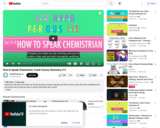
Learning to talk about chemistry can be like learning a foreign language, but Hank is here to help with some straightforward and simple rules to help you learn to speak Chemistrian like a native.
Chapters:
Determining Formulas and Names of Monatomic Ions
Finding Cation-and Anion Forming Elements on the Periodic Table
Writing Formulas and Naming Transition Metals
Naming Acids and their Anions
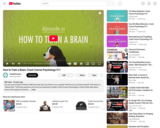
I'm sure you've heard of Pavlov's Bell, but what was Ivan Pavlov up to, exactly? And how are our brains trained? And what is a "Skinner Box"? All those questions and more are answered in today's Crash Course Psychology, in which Hank talks about some of the aspects of learning.
Chapters:
Introduction: Ivan Pavlov
Associative Learning
Classical Conditioning
Behaviorist Theory
Watson's Experiments
Operant Conditioning
Positive & Negative Reinforcement
Primary Reinforcers & Conditioned Reinforcers
Reinforcement Scheduling
Review & Credits
Credits
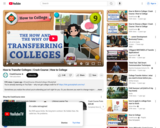
Sometimes you realize the school you're attending just isn't right for you. Or, you discover you want to change majors and a different school has a better program. Or, you've completed your gen ed classes at a community college and are ready to transfer to a 4 year institution. For whatever reason, transferring is something we may have to deal with to complete our college journeys. And, yes, it can be a pain. But, in this episode of Crash Course: How to College, Erica walks us through transferring!
Chapters:
- Introduction
- Common Pathways for Transfer Students
- Preparing to Transfer to a New School
- Transferring Coursework
- Conclusion
Review
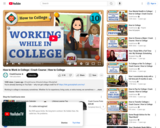
Working in college is necessary sometimes. Whether it's for experience, living costs, or extra money, we sometimes need to balance school, life, and work. In this episode of How to College, Erica walks through some of the ways you can find work and make sure you're balancing work with your studies and your personal life. Which are ALL important!
Chapters:
- Introduction
- Considering Schedules and Time Commitments
- Considering Goals
- Benefits of Working while in School
- Conclusion
Review
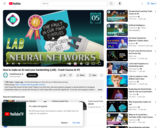
John Green Bot wrote his first novel! Today, in our first ever Lab we’re going to program a neural network to recognize handwritten letters to convert the first part of John Green Bot’s novel into typed text. To do this we’re going to import a labeled dataset, called EMNIST, we’ll use a pre-written library called SKLearn to build the network, we’ll train and tweak our code until it’s accurate (enough), and then we’ll use our newly trained network to convert John Green Bot’s handwritten pages.
We created this project in a way that you don’t have to install anything on your computer, the only thing you’ll need to get started is a Google account and a sense of adventure! To run the Colaboratory file (link at the top) you’ll have to click “open in playground” at the top of the page OR open the File Menu and click “Save a Copy to Drive.” From there you can change, tweak, and edit the code as you wish. We also left text around and within the code to help you along the way. If you use this code in your own project let us know in the comments!
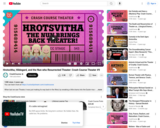
When last we saw Theater, it was just making its way back in the West, by sneaking a little drama into the Easter mass. In today's episode, we're talking about Hrotsvitha, the cool 10th century nun from Lower Saxony who was maybe the first playwright of the new era of theater. She wrote comedies with a moral message, and influenced future heavy hitters like Hildegard of Bingen.
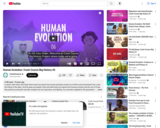
In which John Green and Hank Green teach you about how human primates moved out of Africa and turned Earth into a real-life Planet of the Apes. And the apes are people! John and Hank teach you about how humans evolved, and the sort of tricks they picked up along the way like complex tool use, big brains, and fighting. Our ancestors adapted to the grasslands of Africa and went through several iterations including Australopithecus, homo habilis, and homo ergaster/erectus. Our ancestors tamed fire, made pressure flake tools, and eventually smartphones.
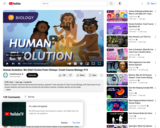
What’s a human? And how did we become humans, anyway? In this episode of Crash Course Biology, we’ll meet some of our closest relatives and trace how we evolved into the brainy, inventive, complex species we are today.
Chapters:
The First Humans
What is a Human?
Hominins
Dr. Xinzhi Wu
Hominin Interbreeding
How Humans Evolved
Review & Credits
Credits
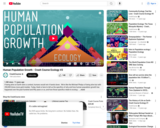
If being alive on Earth were a contest, humans would win it hands down. We're like the Michael Phelps of being alive but with 250,000 times more gold medals. Today, Hank is here to tell us the specifics of why and how human population growth has happened over the past hundred and fifty years or so, and how those specifics relate to ecology.
Chapters:
1) R vs. K Selection Theory
2) Causes of Exponential Human Growth
3) Human Carrying Capacity
4) Ecological Footprints
5) Causes for Decline in Human Growth Rate
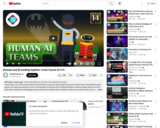
There’s been a lot of discussion about how automation is going to take people’s jobs and we don’t want to downplay that real impact, but today we’re going to focus on the benefits of humans and AI working together. Human-AI teams allow us to fill in each others weaknesses leveraging human creativity and insight with the ability to perform rote manual tasks and synthesize lots of information. This kind of collaboration can help us make better decisions, brainstorm new inventions, give us superhuman abilities, rescue victims of natural disasters, and of course become the ultimate chess master.
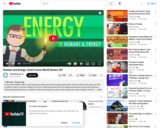
In which Stan Muller subs for John Green and teaches you about energy and humanity. Today we discuss the ideas put forth by Alfred Crosby in his book, Children of the Sun. Historically, almost all of the energy that humans use has been directly or indirectly generated by the sun, whether that be food energy from plants, wind energy, direct solar energy, or fossil fuels. Stan looks into these different sources and talks about how humanity will continue to use energy in the future as populations grow and energy resources become more scarce.
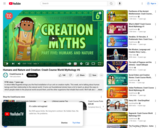
In which Mike Rugnetta brings you the final installation of our unit on creation myths. This week, we're talking about human beings and their relationship to the natural world. It turns out foundational stories have a lot to teach us about the ways in which people relate to the physical world around them, and the other organisms that inhabit that world. We'll talk about the Biblical idea that humans have dominion over animals, and we'll talk about Native American stories in which people and nature collaborate to create the world.
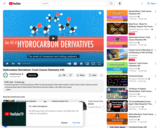
Functional groups? Functional groups within functional groups? Hank takes today's Crash Course video to discuss some confusing ideas about Hydrocarbon Derivatives but then makes it all make more sense.
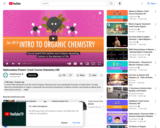
In which Hank introduces us to the world of Organic Chemistry and, more specifically, the power of hydrocarbon. He talks about the classifications of organic compounds, the structures & properties of alkanes, isomers, and naming an alkane all by observing its structure.
Chapters:
Classifications of Organic Compounds
Structures & Properties of Alkanes
Isomers
Naming an Alkane Based on its Structure